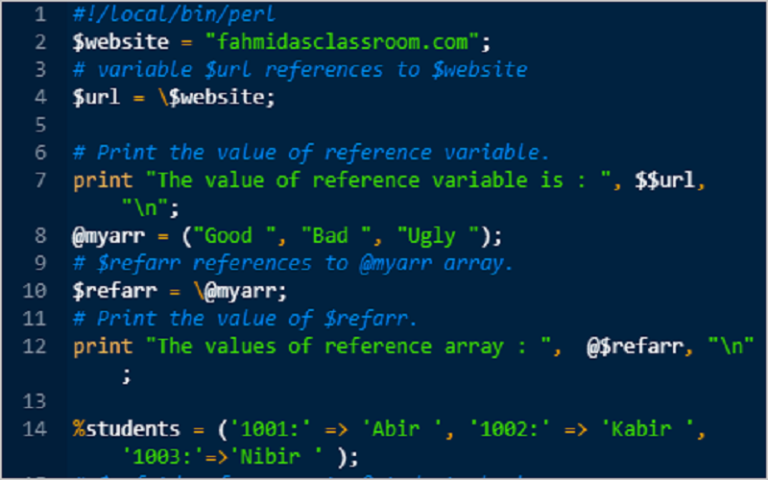


It is impossible to give a complete overview of Perl's syntax here. Some mechanisms of this form of invocation depend largely on the host's operating system, see a separate example for more details. Real world Perl programs are usually stored in files and passed as parameters to the Perl interpreter. You can see the analysis here.īoth examples 2 and 3 contain regular expression matches, which are introduced further down. The third line is one of his simpler examples, but already too involved to explain in the context of an introductory article. In usenet days it was customary to sign one's posting in a Perl thread by a one-liner that produced the string "Just another Perl hacker," (JAPH), the master of which was Randal L. In the middle statement, the 'e' in $g is replaced with an 'a'. The second statement in the second example shows an aspect that is often discouraged for the sake of clarity, the option to write very compact ( terse) code. Perl's motto became "there's more than one way to do it", and this policy had an important influence on the newer Ruby programming language.įor short programs, a Perl script can be invoked directly from the command line, using the '-e' option: Such loose typing is nowadays called Duck typing ("if it walks like a duck, and quacks like a duck, it must be a duck"). Instead, the interpreter decides the type of a variable based on how it is being used (and is generally quite successful at doing so).

As an example, Perl does not require declaration of variable types prior to use. Perl won many supporters due to its approach of leaving much choice to the programmer and not requiring anything that is not absolutely necessary. Perl is currently in version 5, a mature version which allows the creation, export, and import of objects and methods, and has an extensive public library of well-maintained modules and packages ( CPAN).
PERL PROGRAMMING LANGUAGE INSTALL
Many system scripts for Linux distributions are written in Perl, and some commercial Unix systems install Perl by default. Due to its excellent support for strings and the large amount of publicly available modules, Perl has been widely used as a "glue" language between different kinds of technologies such as database access and web programming. Perl's powerful regular expression engine has become an unofficial benchmark against which other programming languages' engines are measured. One of Perl's advantages is its excellent string processing abilities. Perl interpreters now exist for most operating systems,Īnd programs can usually be moved between different operating systems without needing to be changed.
PERL PROGRAMMING LANGUAGE PROFESSIONAL
Perl evolved into a flexible and powerful scripting language and garnered a substantial following with professional support. Wall combined features of a variety of other languages, including C, Unix shell scripting, Lisp, awk, sed, and Unix tools such as the grep family, into a succinct language for system administration. Perl is a dynamic, interpreted programming language created by Larry Wall and first released in 1987.


 0 kommentar(er)
0 kommentar(er)
